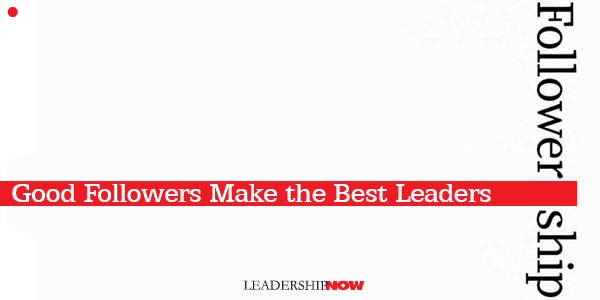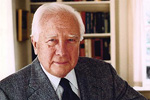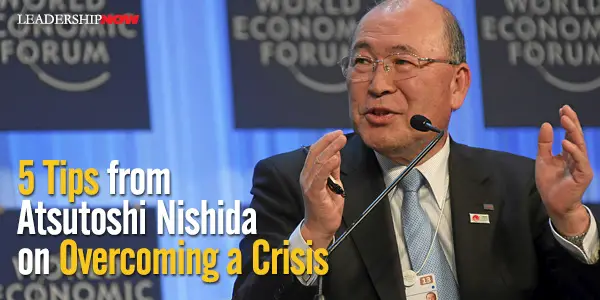 Leading Blog | Posts by Month |
 Leading Blog | Posts by Month |
03.31.08

Aligning Your Leadership to Followers IdentitiesWhen we think about leadership, we tend to focus almost entirely on the leader. Yet without followers, there is no leader. Leadership is participatory: leaders and followers exist in a mutually beneficial relationship where each adds to the effectiveness of the other.Key to this process is listening, because leadership is as much about listening as it is about talking, or perhaps more so. From the beginning, a leader must be informed by the followers’ values, beliefs, and aspirations, the followers’ identity. The commitment gap people frequently experience, the difference between what the leader desires and what the followers actually do, can often be traced back to not aligning the elements of leaders’ and followers’ identities—who they think they are—to find common ground on which to function and grow. In an article that appeared in the August 2007 issue of Scientific American Mind, titled “The New Psychology of Leadership,” authors Stephen D. Reicher, Michael J. Platow and S. Alexander Haslam present research supporting the idea that effective leaders—those who can move followers from one behavior to another—grasp what their followers believe they are and represent, and then create a shared identity. They write, “The development of a shared identity is the basis of influential and creative leadership. If you control the definition of reality, you can change the world.” The link between identity and leadership and its function in understanding the world we live in is therefore of critical importance. We asked two of the article’s authors, Reicher and Haslam, to comment further. LeadingBlog: In the Scientific American Mind article you write that “effective leaders must work to understand the values and opinions of their followers—rather than assuming absolute authority—to enable a productive dialogue with followers about what the group embodies and stands for and thus how it should act.” Does this mean that leaders must learn to communicate with the group on the basis of where they are before they try moving them to a new place? AH Essentially yes. The point is that you can’t lead “us” unless you know what “we” stand for. SR The core of our argument is that a leader needs to construe him- or herself and his or her policies in relation to the shared group identity. This requires, first, a deep cultural knowledge of the group and its history; and second, a set of rhetorical skills that allow the leader to relate the general (group identity) to the particular (self and policies). How are these acquired? One possibility is to acquire the cultural knowledge from the inside as a function of growing up in the group and having an intuitive grasp of “who we are.” However, it is notable that many leaders have been marginal: Hitler, born in Austria; Stalin, a Georgian; Napoleon, from Corsica; Gandhi, brought up in South Africa. In these cases, the person has to make an explicit study of the group and may indeed become more reflexively aware of the nature of the identity than insiders, whose knowledge is taken for granted. They may also have to work harder at being accepted as insiders and thereby hone their skills. LeadingBlog: You define leadership as the followers’ willing compliance with the goals or vision of the leader. If a leader believes it is in the group’s best interest, would he or she ever need to enforce compliance in the hope that willing compliance would eventually follow? AH Sometimes yes, because not all members of a group will have the same confidence that the leader represents them. However, when leaders resort to brute force, it needs to be understood that essentially they are using power, not leading. This is the distinction between “power over” and “power through.” The latter is identity-based; the former is resource-based and is not true leadership. LeadingBlog: It would seem that, at first, many dictators do identify with the people and give them what they want. But once the followers’ needs are met, they want less dictatorship and more freedom. In the case of Hitler, it would appear that he rose from the ranks to give them what they wanted: strong leadership and security. His followers moved toward him and he toward them as they both satisfied each other’s needs. They wanted strong leadership and he wanted to be a strong leader. The result, crazed dictatorship, became possible because of the ratcheting-up effect. In the end he was despised by many who had followed him. AH I think this analysis is largely correct. The problem was that the content of the group’s identity was itself problematic, so in a sense the group got the leader it wanted (and deserved). SR It is perfectly plausible to suggest that leadership may be a developmental process that works differently at different phases. To start with, one does need popular compliance because one is seen to represent the group. That’s the psychological process we have described: gaining power through others by being seen as one of them. This power can then be used to change the political and institutional structures of a society, to gain control over the mechanism of repression: police, courts, etc. That, then, puts one in a position to outlaw dissent and even to exert power over people if they should choose to disagree with one’s proposals. In a sense, there is a shift from a psychological to a political-sociological basis for leadership. At the end of the process, people may realize that the person they hailed as a liberator has become an oppressor, but it’s too late to do anything; for example, the nature of Hitler’s leadership shifts from pre- to post-1933 with the passage of the enabling law, the rise of the repressive apparatus, and so on. However, we shouldn’t overdo the contrast. Hitler still had popular support even as the repressive apparatus was put in place. The repression itself was seen as defending the group against threat (just as Stalin’s terror was seen by many on the inside as self-defense against enemies). What is more, even if people began to dissent privately, their willingness to challenge the system openly and collectively depended on whether they saw others as embracing or rejecting Hitler. In other words, it may be true that active compliance depends on one’s own acceptance of the leader as an in-group member. However, active opposition depends on perceiving that others reject the leader as an in-group member. LeadingBlog: In your article you state that “no fixed set of personality traits can assure good leadership because the most desirable traits depend on the nature of the group being led.” Does this indicate that leadership is learned throughout life through various leader-follower experiences, a kind of leader-follower feedback loop? AH I think that’s probably right, yes. Indeed, we have some (as yet unpublished) work suggesting that the people who turn out to be the best leaders are those who have previously been the best followers. SR There is always a balance in leadership between conforming to existing definitions of the group and reshaping the group identity. It is perfectly true that the ability to advance controversial new notions of identity may depend on being securely accepted as an in-group member. Hence, with time, a leader might be better able to reshape the sense of “us.” It is also true that, insofar as the sense of identity changes as a function of context, the leader needs to be multifaceted and emphasize different facets at different times. Those who fail to do that have a limited shelf life. So, for instance, Britain in war is very different from Britain in peace, and Churchill’s inability to adapt to that resulted in his 1945 defeat. LeadingBlog: David Hulme, in his 2006 book, Identity, Ideology, and the Future of Jerusalem, addresses the role of identity and ideology in the solution to the Jerusalem Question as part of the larger context of the Arab-Israeli conflict. He examines some of the leaders and followers involved in the Arab-Israeli conflict in the context of their identities and ideologies. He notes that in the lives of some of these people, “identity and ideology can shift somewhat through experience.” Do you find that a leader may need to do this to stay relevant and influential? While keeping the end in mind, should effective leaders change their approach and rhetoric as new priorities come into play? AH Again, this is correct, and very much consistent with our idea that social identity is itself context-dependent and labile. Accordingly, leaders have to adapt to the changing circumstances of the group—which sometimes proves impossible (think of Churchill after the war). SR The issue of leadership and conflict is of critical importance. Often, especially in psychology, we act as if prejudice, hostility and conflict arise unaided from the human psyche rather than analyzing how different leaders create images of the other that facilitate hatred. Accordingly, we have to ask both how and why they do this if we want to overcome it. The how is centered on constructions of identity. That is, hatred characteristically derives from an image of a virtuous “us” under threat of annihilation by a demonic “them.” Certainly in the Middle East the conflict is fueled by both sides sharing a sense of victimhood, vulnerability and virtuous suffering. As Peter Novick, for instance, has observed, is peace even possible as long as the Holocaust figures so centrally in Israeli identity? It should be stressed that the ways in which these versions of identity are sustained is not only rhetorical but also practical. To take one key example, Ariel Sharon’s jaunt on the Temple Mount was immensely effective in provoking Palestinian anger and then allowing Sharon to argue that peace was impossible with such a violent “other,” and hence the security agenda had to prevail. This example also speaks to the why of leadership action. Simply, if leaders gain power by being seen to represent us, then the invocation of enemies is a very effective way of securing in-group support. First, the very act of identifying an enemy shows one is concerned for the group. Second, and more critically, the fact that one is seen to oppose this enemy more strenuously than one’s rivals do (in Sharon’s case, Barak’s Israeli Labor Party, then in power) is a powerful tool in gaining advantage over those rivals. Thus intergroup hostility can be a tool in intragroup power struggles, and that is often what makes it so difficult to stop such conflict. LeadingBlog: How identities change is an important aspect of hope for resolution in identity- and ideology-based conflicts. You write that “the emergence of social identity helps to explain the transformation in the strategies of rulers associated with the birth of modern nation states.” Would the emergence of social identity—a shared national identity—also help to explain why we sometimes find ourselves at an impasse on issues of national identity, such as the Middle East crisis? Should leaders be placing more emphasis on issues of identity? AH Again, I think this analysis is basically correct, and quite astute. LeadingBlog: You write of the symbiotic relationship between leaders and followers in your article. If a leader was trying to move a group to a new understanding or reality, would the process be to tap into their shared identity and then attempt to create a new identity? How malleable is identity? AH I think this is a fairly effective strategy. Tony Blair might be a good example of someone who has transformed the British Labour party in exactly this way (which is not necessarily a good thing!). As with the earlier point, identity is malleable (particularly if the new forms of identity work for followers), but there are limits, as indeed Tony Blair found. SR How malleable is identity, then? How much can we reshape it in order to resolve conflict, to change the way we are and what we do? This is an immensely complex question. The short answer, to paraphrase Marx, is that we can make our own identities, but we don’t do so under conditions of our own choosing. Identities have a certain inertia. We do construct them, but over time those constructions are sedimented down into what might be called “material cultures.” What, say, being American means is enshrined in textbooks, in monuments, in the layout of museums and in the structure of institutions. These are all made by people at one point in time as a reflection of identity, but for subsequent generations they become part of the social reality, which in turn shapes identity. If we are to challenge them, then, we need new arguments and new rhetorics, but we also need to create new social realities: new textbooks, new monuments, new rituals, and so on. The skill of a leader, then, must be practical as well as verbal. Leaders, as we put it, must be impresarios of identity. Perhaps, before they can change the world at large, they need to create new structures within the social movement itself that allow people to “live out” the ideas they are advancing and hence to make those ideas more tangible and convincing. Clearly, much of this is rather general. These questions represent an agenda for ongoing research—and what exciting research it will be! The authors are releasing a new book in October 2008 that builds on these concepts. The New Psychology of Leadership: Identity, Influence and Power will be available from Psychology Press.
Posted by Michael McKinney at 12:16 AM
03.26.08

Making the Impossible Possible
SAMUEL JOHNSON once wrote, “The natural flights of the human mind are not from pleasure to pleasure, but from hope to hope.” This statement seems to define Bill Strickland’s life. Make the Impossible Possible is an engaging, inspirational book written with humility and passion. Bill Strickland’s life changed when as a boy in a Pittsburgh ghetto, a teacher took the time to show him that he mattered and allowed him to see himself in a new way. (An integral part of any leader’s job.) As a result, he became open to opportunities and created at 19 what became the Manchester-Bidwell Center, the now famous arts-education and job-training center for disadvantaged kids and adults. This extraordinary school was built on Strickland’s belief that “all of us have the potential to make our dreams come true, and that one of the greatest obstacles blocking us from realizing that potential is that we believe, or are told, that things we want most passionately are impractical, unrealistic, or somehow beyond our reach.” He convincingly demonstrates his belief that: Each one of us, no matter who our parents are, where we live, how much education we have, or what kinds of connections, abilities, and opportunities life may have offered us, has the potential to shape our lives in ways that will bring us the meaning, purpose, and success we long for….I want everyone who comes to this book, no matter what their age or accomplishments or the circumstances of their lives, to rethink their assumptions about what is and isn’t possible in their lives, and to convince themselves that they have not only the right but also the responsibility, and the capacity, to dream big and to make those dreams come true. Strickland narrates his successes and failures, obstacles and opportunities, his thinking and rethinking, as he went about to create the success he has achieved. It’s a fascinating story. While he has dedicated his life to helping other people, he denies the do-gooder label. He writes, “I didn’t do any of it out of selflessness. I did it to be myself. I did it to enrich my own life, to deepen the quality and meaning of my own experience. I did it because it was a part of what I had to do if I genuinely wanted to be me.” How often have we been burdened by self-defeating assumptions? Strickland writes that “once we accept the idea that poverty is, essentially, the acceptance of meager possibility, we can’t deny that all of us are in some fashion poor. We all suffer some form of poverty—poverty of imagination, or courage, or vision, or will. We allow ourselves to be limited by our fears—fear of failure, fear of change, fear of being criticized or of looking like a fool.” This isn’t another see-what-I-did self-help book. It’s a book that invites introspection. Read it and learn from his experience and thinking. 
Posted by Michael McKinney at 02:41 PM
03.24.08

Outsmart Your CompetitionIn the opening pages of Outsmart!, Jim Champy argues that “in whatever field you’re playing, you must outsmart all your rivals. But luckily, the world is expanding rapidly. Shrewd competitors can stake out new territory, define the boundaries, and even set new rules for the game.” How do you do that?Champy demonstrates how eight companies have outsmarted the competition by either: Seeing what others don’t, Thinking outside the bubble, Using all you know, Changing your frame of reference, Doing everything yourself, Tapping the success of others, Creating order out of chaos or by Simplifying complexity. This adds up to a lot of intriguing lessons in how to. While there are no formulas to be found here, there are principles that certainly can be applied in your situation. In general though, Champy says ambition matters. Look for dramatic growth. Of course this means risk and not getting bogged down in research and analysis. Intuition counts. Risk is just part of doing business and we need to get comfortable with it. He writes, “I believe shortsightedness of shareholders prevents many incumbent companies from doing what the need to do to grow.” Risk and innovation need to become part of the culture. Everyone needs to be engaged in the process. In talking with people at every level of the smartest companies I know, it’s clear that they all believe they own a piece of the solution. Because these companies look for distinctiveness in almost everything they do, opportunities abound for everyone to get involved, whether it be contributing ideas or executing them. The inclusiveness also nurtures a company’s growth because everyone see himself as a partner in setting strategy, not a minion being imposed upon from on high.This book will leave you with new questions and generate wide-ranging conversations. It’s a great place to start when reorienting your thinking.
Posted by Michael McKinney at 10:24 AM
03.21.08

Changing Your Nature
Tweaking the way you interpret and react to the world can be a transformative experience, freeing you up to act in new ways. At first, it feels awkward, even bizarre. But with new behaviors come new experiences, creating a feedback loop that, over time, reinforces the transition. British psychologist Daniel Nettle, author of Personality: What Makes You the Way You Are, writing for the BBC, states that when we watch how people respond differently to different circumstances, “something about the way the person is ‘wired up’ seems to be at work, determining how people react to situations, and, more than that, the kind of situations they get themselves into in the first place. This is why personality seems to become stronger as we get older; when we are young, our situation reflects external factors such as the social and family environment we were born into. As we grow older, we are more and more reaping the consequences of our own choices (living in places we ourselves have chosen, doing jobs that we were drawn to, surrounded by people like us whom we have sought out). Thus, personality differences that might have been very slight at birth become dramatic in later adulthood.” While there is no one best personality to have, each has their advantages and disadvantages, we could do better by getting out of our programmed reactions and try to cover some new ground. Nettle recommends, “If you are an extreme introvert, you might want to challenge yourself to experience the rewards of greater spontaneity and exchange; if you are an extreme extravert, you might want to teach yourself to undertake a long and lonely project that will ultimately be very rewarding. As human beings, we have the unique ability to look in at our personality from the outside and decide what we want to do with it.”
Posted by Michael McKinney at 11:20 AM
03.19.08

The Lack of Connection Burns Us OutMichael Stallard's Fired Up or Burned Out, is a book that is worth returning to again and again. He writes that “connection meets basic human psychological needs for respect, recognition, belonging, autonomy, personal growth, and meaning. When these needs are met we thrive…. Conversely, the lack of connection will gradually burn us out.”As leaders our lives touch more people than we can imagine. It is here that we are either making connections with others or we are not. We are either contributing to engagement or burn out. Stallard believes that after we delete the things that devalue others like inappropriate criticism, micro-managing and allowing others who do to continue to do so, we need to dial up the value in at least six important ways:
Stallard writes, “Unless the people in an organization have a strong sense of connection—a bond that promotes trust, cooperation, and spirit de corps—they will never reach their potential as individuals, and the organization will never reach its potential.” Of Related Interest:
Posted by Michael McKinney at 11:17 PM
03.17.08

In Leadership, Context Is EverythingIn leadership, context is everything. As we have said before, leadership hasn’t changed—the context we operate in has changed. Russell Palmer’s book Ultimate Leadership is on target. He believes that “the principles of leadership can be effective in a wide variety of situations, but often they need to be applied in a very different manner depending on the circumstances and the constituent groups involved.”This of course, makes perfect sense, but what makes no sense is how often it isn’t applied. We tend to plow along the way we have always done things without regard to our current situation. Palmer writes, “Success or failure can often depend on modifying leadership styles to suit a different context.” While there is no single style of leadership that works in every situation, there are basic principles of leadership that apply universally. Palmer explains some of those principles such as integrity, execution, good judgment, innovation, communication and people skills among others. The core of the book provides practical, well-heeled advice on applying basic leadership principles in a variety of contexts. He discusses execution and the pros and cons of specific contexts such as top down, crisis leadership, partnership of peers, academic, entrepreneurial organizations, non-profits, government, and the military. He includes a great deal of his personal experience and interviews with thoughtful people in each of these areas. When leading “partners and peers who have relatively narrow specializations,” Palmer points out, “leaders need a broad view. In other words, they must be generalists who know a good deal about many things. One of the problems in today’s society is that we develop more and more people with narrowly specialized knowledge…. The best subject from an educational standpoint for a leader is the study of history. Reading biographies is also particularly helpful…. The best education, for instance, for a businessperson is a strong liberal arts undergraduate program and then a graduate business program.” In the end, he concludes, it’s all about people.
Posted by Michael McKinney at 12:12 PM
03.14.08

Good Followers Make the Best Leaders IN CASE you didn’t know it by now, let me just say, followership is the crucible of leadership. There is no better way to learn leadership than by being under someone else—leading from the second chair. As ironic as that may sound, it’s true. Learning to lead under someone else provides you with the opportunity (the necessity) to learn to lead without coercion. You learn to let your leadership speak for itself—authentically.
IN CASE you didn’t know it by now, let me just say, followership is the crucible of leadership. There is no better way to learn leadership than by being under someone else—leading from the second chair. As ironic as that may sound, it’s true. Learning to lead under someone else provides you with the opportunity (the necessity) to learn to lead without coercion. You learn to let your leadership speak for itself—authentically.
Yet we still, as Barbara Kellerman states in her important new book, Followership, overestimate the importance of leadership and underestimate the importance of followership. She argues that “thinking leadership without thinking followership is not merely misleading, it is mistaken.” Why? The context of leadership has changed. First, leaders have been demystified, in part by modern media, which demands grist for its mill 24/7; and in part by the modern culture, in which figures of authority are no longer exalted or even so much respected. Second, because the line between the leader and the led has been blurred, the led have been emboldened. She points out that much of this is cyclical. I would agree. It’s hard for human beings to find balance. Consequently, we continually find ourselves reacting to someone else’s excessive behavior. While we have spent a great deal of time distinguishing between types of leaders, we have not done the same with followers. Kellerman spends a good portion of the book explaining followers. She describes four types: Bystanders, Participants, Activists, and Diehards. She writes: “Followers are us. This does not, of course, mean that all of us follow all of the time—sometimes we lead. But all of us follow some of the time. It’s the human condition.” She advocates that followers not try to become something else, but more importantly that they change their response to their rank, their response to their superiors and to the situation at hand. She emphasizes:
What we need now is a Followership Part 2, where it is explained to followers just how one should follow. We do a disservice to followers – as we have with leaders – by requiring no character development and self-discipline. When we learn to develop better followers, we will get better leaders. 
Posted by Michael McKinney at 10:06 AM
03.12.08

Understanding People Must Include Their IdentitiesMichael Maccoby states in a must read book, The Leaders We Need, that to lead in the global enterprise you'll need to know even more about people. It has always been so, but in past, one was able to get away with not getting to know those you were leading. The place to begin is to find out where they are at. He writes:By satisfying the demands of identity groups, leaders don’t necessarily gain willing followers. But if these identities are not respected, leaders will be less willingly followed, possibly resisted.
Posted by Michael McKinney at 08:32 AM
03.10.08

The Great Leadership Lessons Don’t Change The American historian Samuel Eliot Morison liked to say that history teaches us how to behave—that is, what to do and what not to do in a variety of situations. History is the human story. Jefferson made that point in the very first line of the Declaration of Independence: “When in the course of human events…” The accent should be on “human.”He also says that we need to be developing leaders at all levels: We need leaders and not just political leaders. We need leaders in every field, in every institution, in all kinds of situations. We need to be educating our young people to be leaders. And unfortunately, that’s fallen out of fashion.The interview contains a lot of good material and is available for free on the Harvard Business web site.
Posted by Michael McKinney at 08:51 AM
03.07.08

Inspiring the Will of the Team The ability to inspire and make a difference in a young person’s life is an awesome responsibility. Good coaching brings out the very best in both players and coaches. Coaches, like Army Drill Sergeants, teach a lot more than just skills and tactics, they teach determination, discipline, and character, both in and out of uniform. Coaches and military commanders face a similar prospect; how do you develop and maintain a winning organization year in and year out, when the capabilities and competence of your “bench” and the cohesion of your unit are constantly in flux? To develop formative training and innovative leaders you have to instill a “Warrior’s Spirit” in your players. And to cultivate a “Warrior’s Spirit”, you must first establish the core identity, direction and doctrine for your organization. But the development of a “Warrior Ethos” is not a goal line or battlefield revelation. It is a principled work ethic that builds mental stamina as well as physical prowess. Coaching character is as much, if not more, about the will of the coach as it is about the will and the work of the athlete. The “will of the Coach”, I like that. It emphasizes that the onus for results resides with the one who leads, who teaches, and who sets standards for the unit. As combat and football are both human endeavors, there exist some very real and decisive elements to these contests of wills that dramatically affect their conduct and outcome. “Shifts in momentum,” “seizing the initiative,” “fan base and fanaticism,” “national will,” “officiating,” “media bias,” “play making,” “pressure,” “injuries” and “leadership;” are all indisputable and unpredictable aspects of these activities. How do you develop that elusive “something” that soldiers and players draw on at “crunch time?” It is the character of the leader and the character of the organization that inspires loyalty across the formation, musters the reserves and evokes a “Warrior’s Ethos:”
In football as in combat—to win the day, you’ve got to win the moment, and when that moment arrives it’s the character of the man, the character of the team and the character of the coach that will decide the contest.
Posted by Michael McKinney at 01:16 PM
03.04.08

Five Tips from Atsutoshi Nishida on Overcoming a Crisis
THE Wall Street Journal interviewed Toshiba Chief Executive Atsutoshi Nishida who recently pulled the plug on the company's HD DVD business. From that interview came the following wisdom regarding crisis leadership in particular but good ideas to keep in mind regarding the daily crises we often face in the minutia of our day.
That fifth step is important to keep in mind as it helps you keep things moving forward rather than getting bogged down in your current situation. Things change. Most things are cyclical. He explained the balance between practicality and enthusiasm in decision making. I don't operate just on logic. I'm practical, but I also have enthusiasm, which is the side of me that's not practical. If you have that in addition to a strong will to achieve your goals, then you can overcome any adversity. For example, I used logic to rationally make the decision to quit HD DVD, but my enthusiasm allows me to move forward. Enthusiasm too helps us to reframe our problems in a way that is constructive. This is not naïve optimism, but an informed optimism that reflects the reality of the situation.
Posted by Michael McKinney at 01:10 PM
03.02.08

Leadership Books: March 2008Here's a look at some of the best leadership books to be released in March.




Posted by Michael McKinney at 10:57 PM
|
BUILD YOUR KNOWLEDGE


How to Do Your Start-Up Right STRAIGHT TALK FOR START-UPS 
Grow Your Leadership Skills NEW AND UPCOMING LEADERSHIP BOOKS 
Leadership Minute BITE-SIZE CONCEPTS YOU CAN CHEW ON 
Classic Leadership Books BOOKS TO READ BEFORE YOU LEAD |
|